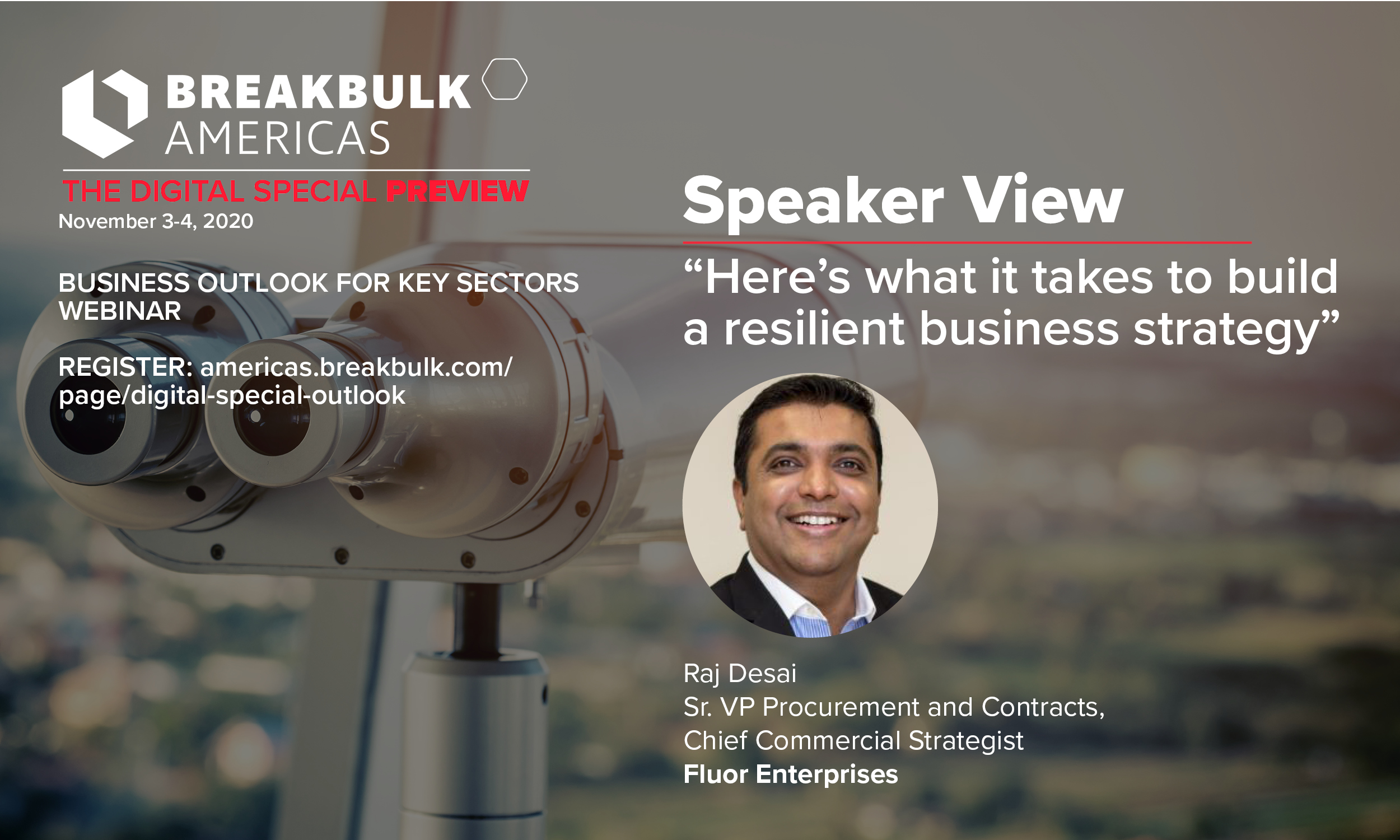Oct 05 | 2020
(Americas Digital Special) Fluor's chief strategist on 'taking the wheel' for project planning

I caught up with Raj in his Houston office where he was in the midst of two days of strategy planning meetings. He set his computer to “away” and dedicated the next 20 minutes to sharing his insights on business resilience and the strategic planning process to our Breakbulk community. Here he sets the stage for the upcoming Breakbulk Americas Digital Special session "Business Outlook for Key Sectors.”
Leslie: How has the pandemic affected the project pipeline and projects ready to start construction?
Raj: I can tell you from the industry viewpoint that projects are definitely affected. Investment patterns have changed. Clients have basically gone back and suspended some of the projects and some of them have been cancelled. And, for the projects that are in existence, we have issues there as well because of a disrupted supply chain.
We had suppliers who could not go back and start their manufacturing operations in certain countries. This is something we saw broadly during March, April and May, but slowly and steadily we see things improving and the supply chain getting stabilized. We're getting our materials coming back on track and we expect a positive turn in the market pretty soon.
Leslie: Do you anticipate any long-term impact or shifts in where manufacturing will occur?
Raj: We're talking about a lot of changes in supply chain strategies internally and we are talking with our big suppliers who have manufacturing capabilities overseas. This may take a new shape pretty soon.
We are also seeing consolidation of the supply market with some of the small manufacturers that will likely be consolidated with the bigger ones, and then some of them will go away altogether because of the current economic situation.
We do see that effect for sure, but at the same time I can tell you that we have seen manufacturers getting stronger over the last couple of months. They are restarting their manufacturing capabilities. While we’ll see a change, the changes may not be as drastic as people fear.
Leslie: What markets or sectors over the last few months have been the most resilient and what do you attribute that to?
Raj: In a broad sense, companies like Amazon, Facebook, Microsoft and Apple can’t be put into any particular sector because of their market depth and breadth across the world. If you look at the sectors that have done well, I would basically look at the pharma sector, the healthcare sector and the food sector.
The small retail discounters have also done quite well. As you move on into the other sectors where we have seen problems, these are basically manufacturers. But it all depends on how this whole thing is going to move forward, and I'm pretty optimistic.
Finally, the world has to go on. We will have all the basic things that we need. The human population will continue to exist, and it's all about the timing on when we get the vaccines in place. And if we get those vaccines in place, I can tell you all these sectors are ready to rebound. That even includes the manufacturing sector, the industrial sector, as well as the oil and gas industry. There is no reason for them not to rebound because I don't see a permanent deformation in any of these sectors so far.
Leslie: What does the strategic planning process look like when you're viewing a somewhat uncertain landscape?
Raj: The buzzword in the industry these days is resilience and business resilience is what we're talking about here. You can build in a set of contingencies. You can basically have modularity in terms of small sectors that can be affected, but would not collapse the entire system. Business diversity definitely helps a company be more resilient.
Those are some of the things that you can build in, but I see resilience as a continuous process. You go through and navigate through the different business environments that come over a period of time. If you are sitting at the wheel of your industrial sector, you are basically going to sense and then you are going to drive. You will steer and adjust your business. You sense what is changing and shift—you are responding and adapting. Then you will be able to transform your organization to get to the new path and make sure that the organization keeps on the path of progress. And then you flourish.
If you have questions for Raj, register for the “Business Outlook for Key Sectors” webinar on Tuesday, Nov. 3 at 10:00 a.m. CDT and you will be able to post your questions during the session.
Watch the full interview with Raj Desai
Subscribe to BreakbulkONE and receive more industry stories and updates around impact of COVID-19.
